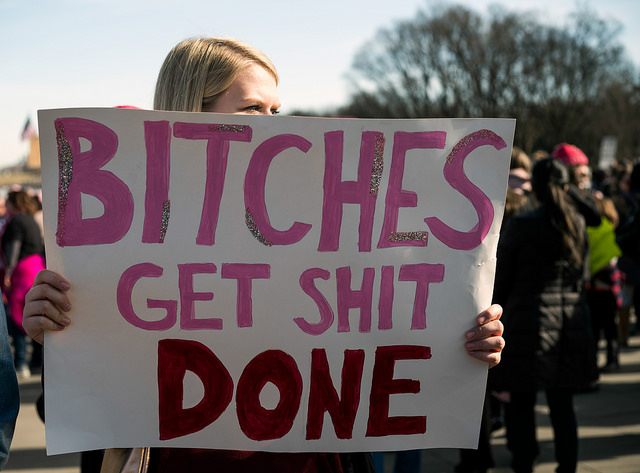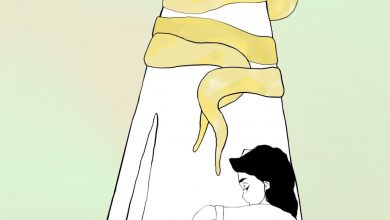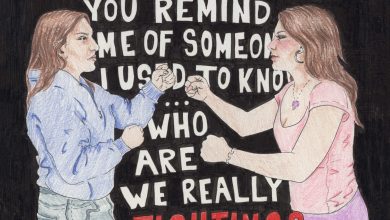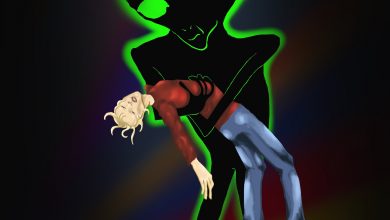What It Means to Be a Female Dog

Photo by Andrew Griffith from the 2018 Washington, D.C. Women’s March via Flickr
“The most effective way to destroy people is to deny and obliterate their own understanding of their history.” If George Orwell replaced the word “people” with “women,” he may very well have been anticipating the predicament surrounding the word “bitch” today.
“Bitch” is used in empowering music lyrics and misogynistic insults alike, because no one can seem to agree on a single definition. Similarly, the feminist community lacks a consensus on whether this word should be reclaimed or thrown out of our vocabulary altogether.
This dilemma stems from a fundamental misunderstanding of the history of the word “bitch” in the first place. Words have important contexts that surround them — entire discourses that help shape the meaning of the world altogether. For example, the n-word is loaded with violent and racist connotations, creating a social reservation around non-Black individuals using it. Loaded words like this require thoughtful analysis of where they stem from and how they change over time. So in order to interpret what “bitch” really means, both in definition and for the feminist community, we must first consider the history of the word.
Unsurprising to many, the technical definition of this word is “a female dog.” “Bitch” was used strictly in this sense for nearly 400 years before it became a derogatory phrase used against women. Beginning in the 15th century, the word became an insult toward “lewd and sensual women.” The connection may seem unclear to a modern reader, but the phrase was meant to suggest that women were as promiscuous as female dogs that have frequent breeding cycles.
A century later, the insult was applied to men as well, but took on a different meaning. Rather than a direct attack on a man’s sexual life, to be called a “bitch” was a somewhat endearing term. However, to be called a “son of bitch” was an insult, since it implied one’s mother was promiscuous.
It wasn’t until the 1920s that the word “bitch” exploded in media and literature. In fact, for most of the 19th century, the usage of the word stayed relatively stable and even seemed to decrease, but between 1915 and 1930, the use of the word more than doubled. Not coincidentally, women gained the right to vote in this same time frame. The word retained its 15th century synonymity with promiscuity but was also used loosely to refer to women who had wronged men. In the 1930s, “bitch” became synonymous with “complain.” This was unspecific to a particular gender, since both men and women could be described as “bitching.”
The 1970s saw another renewal of this word as pop culture icons began to use it in art. Miles Davis released his Bitches Brew album, supposedly alluding to the talent of the artists in the album. Rolling Stones released “Bitch” in 1971 and Elton John recorded “The Bitch is Back” in 1974. This all led to the popularity of Jo Freeman’s “Bitch Manifesto” which is a landmark of Second Wave Feminism. Around the time this manifesto was released, the word began to connote more than just sexual promiscuity because women started to reclaim the word and give it more of a positive connotation of strength. This movement was strictly counter cultural since “bitch” was still used as a slur.
By the 80s and 90s, “bitch” evolved into an even more violent and misogynistic phrase. Rap artists like Slick Rick, Ice-T, and Dr. Dre were among the first to use “bitch” in this way. In their songs, bitches are jealous, manipulative, and aggressive women who hurt men. Similarly, these rap artists influenced prison and gang culture, so men began to insult one another by calling each other “bitch.” The word implied that a man had power over another man if he declared “you’re my bitch.” This is uniquely misogynist because the phrase derived from “bitch” being a slur as opposed to it referring to female promiscuity.
As men continued to use the derogatory phrase, female rap artist Trina released “Da Baddest Bitch.” In doing so, the phrase became a badge of empowerment. Her song inspired other female musicians like Madonna to reclaim the word as well. This culminated in 1996 in the founding of feminist magazine Bitch, which believes that “if we choose to reappropriate the word, it loses its power to hurt us.”
By the 2000s, the phrase popped up everywhere. Most millennials remember Britney Spears’ comeback from her public breakdown in 2007 with the release of the song “Gimme More,” in which she declares, “it’s Britney, bitch.” Between 1998 and 2007, the use of the word nearly tripled, especially among media outlets. The definition broadened to include meanings related to despair, anticipation, fear, and even joy. Somewhere between “betches” and “beyotches,” the word seems to have lost a single definition, context, or purpose.
Today, the word remains problematic insofar as it relates to power dynamics in both the workplace and politics. Women who assert too much power are often deemed “bitches,” while men who don’t uphold enough power are also insulted with this phrase. Of course, one need not look further than the 2016 election to see how this plays out in politics. Trump supporters created campaign materials with the phrase “Trump that Bitch” strewn on merchandise. In response, Clinton supporters wrote articles such as “The Bitch America Needs” in defense of their female candidate.
The paradox between insult and empowerment has yet to be solved. Before we take a stance, though, it’s important to consider this history of what it means to be a female dog.




